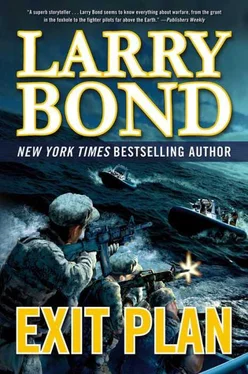Which they had all discussed, and planned for. If the Shavit’s efforts were detected, or some fluke of atmospherics increased detection ranges, the Iranians could be wide awake when the raid arrived. But what was the worst that could happen?
Every radar and SAM site along the raid’s path was being targeted, just in case. With enough warning, the Iranians could get some fighters in the air, or at least more fighters than with no warning, but none of the Iranian planes were a match for the Israeli aircraft. In fact, Zohar had been forced to punish a few of his boys who were too overconfident. But there were two squadrons of F-161 escorts between the Iranian interceptors and the strike aircraft, and once the two squadrons of strikers had delivered their load, they were equally lethal in the air. The Iranians would have better luck trying to take a bite from a chainsaw.
Daniel was a junior captain, but was one of the best back-seaters in the squadron. And it was best not to take chances. “Understood, Dan. We will descend as planned.”
“This is Yuri to all squadrons. The lion sleeps. You are cleared through the IP.” General Tamir’s message was a little redundant, since they planned to proceed unless ordered otherwise, but positive confirmation was worth the effort. The voice transmission was via satellite, and encrypted like the data link, so the chance of detection was nil.
Zohar looked at the American surveillance aircraft on his display. They had a perfect position to watch the approach. There was nothing they could do to stop the Americans, but nothing they needed to do about it, either.
Daniel’s report came on schedule. “Five minutes to IP.”
The colonel was watching the clock count down and reviewing the descent plan when the symbols started appearing on the display. His threat warning receiver was almost shouting at him, displaying multiple air intercept radars — more than he could count — ahead of them.
“Daniel, do you have this?”
8 April 2013
0455 Local Time/0155 Zulu
Over Western Saudi Arabia
General Tamir forced himself to step away from the console operator. Breathing down Ari’s neck was not helpful, and he could see the screen fine from a few steps back. He just could not comprehend what he was seeing.
The raw sensor display was almost useless, covered with bearing lines from literally dozens of fighter radars, all appearing in the last ten seconds.
“They’re all American — APG-73 and APG-79 radars, General.” That meant Hornet and Super Hornet fighters from the U.S. carrier.
The shock filling the lieutenant’s voice was not just from the sudden appearance of so many signals, but their position. The fighters lay in a band directly across the raid’s path. Altitude was hard to determine based on passive signals, but Tamir would bet they were at the same altitude. That location could not be an accident.
Okun’s voice pulled the general away from the console. “Yuri, someone’s calling the raid on military distress.” The international military distress frequency was standardized at 243 megahertz, and was a good way to talk to a military aircraft if you didn’t know which frequencies he’d be using. Meeting his deputy’s eyes, Tamir tapped his headset with one finger, and Okun switched him over.
“Israeli aircraft, this is United States Navy carrier air group commander. Turn around and return to base. If you continue to approach Iranian airspace, we will fire on you.”
Tamir quickly hit the channel selector switch on his headset. “David, this is Yuri. Do not acknowledge. Do not respond to the American transmission. Confirm by voice.”
Colonel Zohar responded, “I heard the transmission, Yuri. I will not respond.” Zohar managed to sound like answering the Americans was the last thing he’d do. “Interrogative, over.”
“Stand by.” Interrogative was right, Tamir thought. What was the Americans’ game here? Did they really want to stop the attack? Although he’d been briefed about Israel’s disagreement with the U.S., he’d marked it up to caution and distance. They didn’t feel it was their fight, but the U.S. had as much to gain as Israel did, although he…
“General!” It was Dvir, watching the Iranian air defenses. “The Kolchuga array near Bushehr is picking up the American radars. They’re still trying to sort out the picture, but there’s a lot of traffic between the operators and southern sector headquarters.”
The Kolchuga was one of the few modern sensors in Iran’s air defense network. Designed by the Russians, Iran had bought the system from Ukraine after the collapse of the Soviet Union. It used broadband ground-based receiving stations to detect and quickly triangulate the position of planes using radar. Kolchuga could actually detect planes much farther out than radar, because the signal from a radar antenna continued to be detectable long after it was too weak to send an echo back to the plane that transmitted it.
That cut it. With the Iranians’ attention attracted to this part of the sky, the raid’s chances of catching the Iranians by surprise had just dropped from excellent to nil.
Tamir grimaced. “Ari, watch for changes in their radar status. Yoni, sit on Southern Command headquarters. Tell me if they start talking…”
“Yuri, the American is still calling for them to turn around. Distance is down to one hundred miles.” Colonel Okun sounded worried. Did he think the Americans would really shoot?
“I’m going to push them, Epher. They may be posturing. Being so openly against us may get them points with the Muslim world.” But we will remember how this tipped off the enemy , Tamir thought.
Switching voice channels back to the raid leader, he said, “David, energize your radars and lock up the Americans.” There’s no point in being quiet now.
“General, I’m getting jamming signals.” The intercept officer pointed to strobes on the screen. “It’s affecting communications as well as the radars. We’ve lost the data link to the raid. The Americans are jamming that, too.”
Tamir turned to the communications officer. “Get me a channel on military distress!”
8 April 2013
0503 Local Time/0203 Zulu
Over the Saudi Coast
Zohar didn’t need the general’s order to energize his radar. Without the data link, the raid was blind, and he couldn’t afford that now.
The American was still talking on 243 megahertz. “Israeli raid commander, this is U.S. Navy carrier group commander. You must abort your attack. I am under direct orders from my president to open fire if you do not turn around. Please acknowledge.”
“David, I’m having trouble getting a lock.” Daniel’s voice on the intercom cut though the American’s voice. “The jamming knocks me off every time I try to track one of them. And detection range is way down as well.”
“Stands to reason, Daniel. The Americans sold us these radars. We’re lucky we can see anything at all. We’ll be in range for heat-seekers soon.” Zohar wondered how long they would continue to jam. Would the Americans stop if he could get the raid past them into Iran? Would they really shoot?
“Israeli commander, what’s your fuel margin? Can you afford to fight us and still attack your primary? We won’t let you divert to Iraq afterward. Any Israeli plane that lands there will be permanently impounded.”
That was bad news. Zohar had told all four squadrons that in spite of the deal with the Saudis, if they were damaged, to head for a U.S. air base in Iraq first, either Baghdad or Tallil. Better chance of getting both the plane and pilot back than with the Saudis, he’d thought.
Читать дальше












